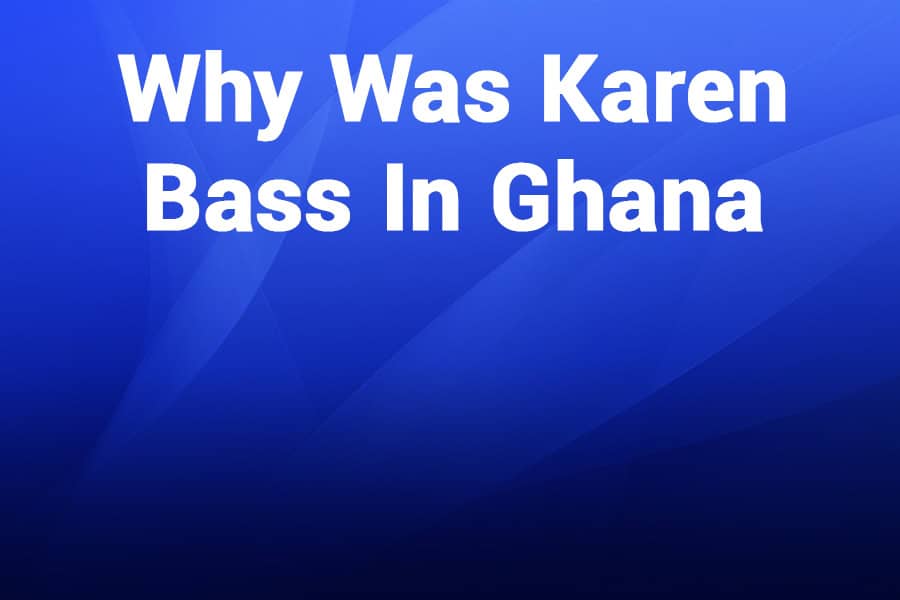In recent years, U.S. political leaders have increasingly turned to Africa to strengthen global partnerships, expand cultural diplomacy, and confront historical narratives. One such moment that garnered attention was when Karen Bass, the current Mayor of Los Angeles and former U.S. Congresswoman, visited Ghana. So, why was Karen Bass in Ghana?
Her visit sparked interest not only among African and African-American communities but also within political and diplomatic circles. As a well-known advocate for human rights, international relations, and U.S.–Africa partnerships, Bass’s presence in Ghana carried significant weight. In this article, we break down the timing, motives, historical context, and implications of her visit. You’ll gain a comprehensive understanding of the goals behind her trip, including its political, social, and cultural dimensions.
Whether you’re curious about global diplomacy, African diaspora engagement, or Karen Bass’s long-standing ties with Africa, this in-depth piece will give you everything you need to know.
Why Was Karen Bass in Ghana?
Karen Bass was in Ghana to promote cultural diplomacy, strengthen U.S.-Africa relations, and engage in discussions about economic development and historical ties.
The Political Backdrop of Karen Bass’s Visit to Ghana
Karen Bass’s trip to Ghana was not just a casual stop—it was deeply rooted in her political vision and decades-long advocacy for Africa-U.S. relations. As a former Chair of the House Foreign Affairs Subcommittee on Africa, Bass has long pushed for increased engagement between African nations and the U.S. Her visit aligned with broader U.S. diplomatic goals of strengthening partnerships, countering global influence from rival powers like China and Russia, and reconnecting with Africa on trade and development.
The timing of the visit also aligned with the “Year of Return” and subsequent initiatives led by Ghana to welcome African descendants back to the continent. Bass’s presence reaffirmed the U.S.’s interest in supporting these cultural initiatives and addressing historical injustices. Her background in community organizing, healthcare advocacy, and foreign policy all converged during this symbolic and strategic visit.
The visit wasn’t just ceremonial—it included high-level meetings with Ghanaian officials, discussions on investment opportunities, and efforts to enhance educational exchange programs. By placing herself physically and symbolically in Ghana, Bass demonstrated her commitment to Africa’s future and America’s role in it.
When Did Karen Bass Visit Ghana and Why Then?
Understanding the timing of Karen Bass’s visit to Ghana helps reveal its deeper diplomatic and cultural significance. Here’s why the moment was strategically important.
Context of the Visit
Karen Bass’s visit to Ghana came at a pivotal moment when U.S.–Africa relations were beginning to experience renewed focus. As both regions explored ways to rebuild and redefine their partnership, Bass’s presence was timely, reinforcing political and cultural ties that had long been in development. The international community was watching closely, making the visit even more significant in terms of diplomatic visibility.
Symbolic Timing
Her trip coincided with major cultural initiatives such as Ghana’s “Year of Return” and subsequent programs aimed at engaging the African diaspora. These movements were designed to reconnect African descendants with their roots, and Bass’s involvement emphasized the emotional and historical value of these initiatives. Her visit underscored the importance of acknowledging shared heritage and strengthening transcontinental unity.
Political Opportunity
The timing also aligned with a shift in U.S. foreign policy priorities, allowing room for influential leaders like Bass to act as connectors between African governments and American institutions. Her role as a bridge was both strategic and meaningful, enabling her to advance diplomatic efforts and legislative interest in African partnerships.
Media and Diplomatic Impact
The visit gained media attention, opening the door for broader conversations on investment, education, and collaboration. It sparked diplomatic dialogue and highlighted shared interests that could lead to long-term partnerships between the U.S. and Ghana.
Follow-Up Diplomacy
Importantly, Bass’s presence laid the foundation for future initiatives. Her meetings with Ghanaian leaders established the groundwork for ongoing cooperation in areas such as economic development, youth engagement, and education.
Purpose of Karen Bass’s Ghana Visit Explained
Karen Bass’s visit to Ghana served multiple purposes, all aimed at long-term U.S.-Africa collaboration:
- Strengthening Diplomatic Relations: She met with Ghanaian government officials to discuss future cooperation.
- Cultural Exchange and Diaspora Engagement: Participated in heritage events connecting African-Americans to their roots.
- Economic Development Discussions: Addressed trade, business development, and youth entrepreneurship.
- Educational Initiatives: Explored programs to expand academic exchange between Ghanaian and American institutions.
- Human Rights and Historical Justice: Honored shared histories of struggle and resilience between Africa and the diaspora.
- Boosting Public Diplomacy: Represented U.S. values and vision through public appearances and grassroots outreach.
How Karen Bass’s Ghana Visit Supports Her Long-Term Vision
Karen Bass has long championed stronger connections between African-American communities and the African continent, and her visit to Ghana was a powerful step in realizing that vision. By engaging in high-level discussions and participating in grassroots cultural events, Bass demonstrated her ongoing commitment to bridging cultural and political divides. Her presence not only symbolized ancestral reconnection but also aligned with her broader mission of advancing Black political empowerment, inclusive foreign policy, and global solidarity.
Ghana represented more than a symbolic destination—it was strategically chosen to reinforce Bass’s advocacy for human rights, healthcare equity, and international development. Her work on these issues in the U.S. found meaningful parallels in Ghana, where she could promote sustainable partnerships. The visit helped deepen diplomatic and cultural relationships while showcasing her commitment to creating lasting ties between Africa and its diaspora through active engagement, shared progress, and collaborative growth.
Why Was Karen Bass in Ghana — A Strategic Moment for Cultural Diplomacy
Karen Bass’s visit to Ghana represented more than a diplomatic stop; it was a defining moment in cultural diplomacy between the United States and Africa. Here are five key ways her presence played a strategic role:
- Reconnecting Diaspora Communities: Bass actively supported Ghana’s initiatives aimed at reuniting African-Americans with their ancestral roots. Her involvement lent visibility and political weight to programs designed to honor shared heritage and historical ties.
- Strengthening Bilateral Ties Through Soft Power: Rather than traditional diplomacy, Bass’s visit focused on building trust through cultural exchange, dialogue, and public engagement. It showcased how soft power can be just as effective as policy in forging international relationships.
- Showcasing U.S. Political Support for African Initiatives: Her presence signaled strong support for Ghana’s leadership in regional development and continental progress. It demonstrated that U.S. leaders are paying attention and willing to invest in African-led solutions.
- Empowering African-American Political Narratives: The trip highlighted the importance of including African-American voices in foreign policy. Bass’s engagement set a precedent for how diaspora communities can play a role in shaping global relationships.
- Setting a Precedent for Future Engagements: Bass’s visit paved the way for continued high-level engagement, encouraging future American leaders to maintain strong diplomatic and cultural relationships with African nations.
In Summery
Karen Bass’s visit to Ghana was not merely symbolic—it was a calculated and impactful move aligned with her long-standing values and broader U.S. foreign policy goals. Through diplomatic meetings, cultural events, and public engagements, she reinforced the importance of cultural diplomacy and fostered stronger ties between the United States and Africa. Her presence highlighted a growing effort to bridge the historical and contemporary connections between Africa and its diaspora.
Understanding why was Karen Bass in Ghana sheds light on a deeper mission: to promote unity, advance collaborative development, and create meaningful dialogue across continents. Her journey stands as a model for future engagement rooted in respect, heritage, and shared progress.
FAQ’s
Why did Karen Bass choose Ghana over other African countries?
Ghana has strong historical ties with the African diaspora and actively promotes cultural reconnection programs like the Year of Return.
Was Karen Bass in Ghana for an official U.S. diplomatic mission?
While not on behalf of the U.S. government, her visit had diplomatic and political significance tied to her congressional role and advocacy.
Did Karen Bass meet with Ghanaian leaders during her visit?
Yes, she engaged in meetings with political officials, educators, and cultural leaders to discuss collaboration.
How does this visit impact U.S.–Africa relations?
It reinforces a more inclusive and culturally aware form of diplomacy, helping reshape U.S. engagement with Africa.
Will Karen Bass continue to engage with African countries?
Given her track record and vision, she is expected to play a continued role in promoting Africa-U.S. cooperation.





Leave a Reply